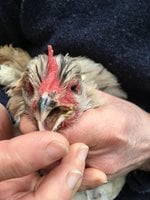My 4 year old Maran has developed a lump on the side of her face, just behind her beak. Her eye is slightly closed by the swelling. On opening the beak there is a white swollen area and a lot of yellow white pus. On the outside it looks infected. It also smells unpleasant. She is obviously in discomfort with this but is otherwise healthy and trying to eat although must be struggling with a pus filled mouth.
How can I treat this? I assume it’s an abscess in her cheek which is infected. Unfortunately I don’t think I can justify vets bills for this. I’m based in the UK.
Thanks for any advice.
How can I treat this? I assume it’s an abscess in her cheek which is infected. Unfortunately I don’t think I can justify vets bills for this. I’m based in the UK.
Thanks for any advice.




